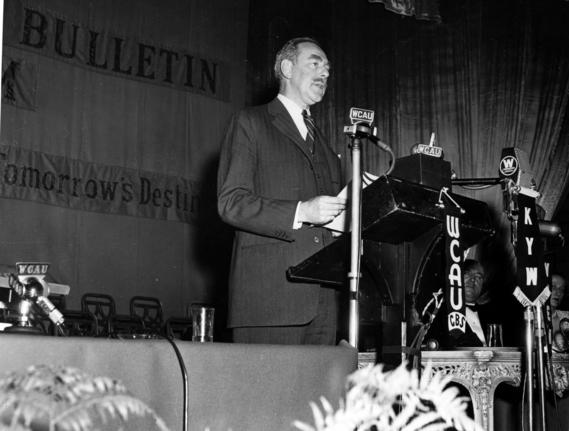President Barack Obama’s recent downcast West Point speech and inadequate response to Iraq’s collapse bring to mind an earlier time when, exhausted by conflict, America cut its overseas military commitments only to be drawn into the Korean War. In the 1950s, Asia’s security outlook was grim. China hadnt long ‘fallen’ to the communists; Indonesia had just secured independence from the Dutch. The region was in massive political transition, it was poor and facing numerous insurgency conflicts. America’s priority in the region was managing occupied Japan. Its biggest strategic concern was the developing axis between Moscow and Beijing. US military forces largely quit South Korea in 1949.
In January 1950, US Secretary of State Dean Acheson delivered a speech to the New York National Press Club that appeared to limit American strategic interests in Asia to a ‘defensive perimeter.’ This ran from the Aleutian Islands through Japan, to the southern Ryukyu island chain including Okinawa, and from there to the Philippines. Absent from Acheson’s perimeter was South Korea and Taiwan. In fact, the speech quite explicitly stated that the rest of Asia was outside the boundaries of American security thinking:
So far as the military security of other areas in the Pacific is concerned, it must be clear that no person can guarantee these areas against military attack. But it must also be clear that such a guarantee is hardly sensible or necessary within the realm of practical relationship.
Should such an attack occur—one hesitates to say where such an armed attack could come from—the initial reliance must be on the people attacked to resist it and then upon the commitments of the entire civilized world under the Charter of the United Nations. … But it is a mistake, I think, in considering Pacific and Far Eastern problems to become obsessed with military considerations. Important as they are, there are other problems that press, and these other problems are not capable of solution through military means.
On 25 June 1950, North Korean forces, well-armed and supported by the Soviets, crossed the 38th parallel and invaded the South. ROK forces lacked armour and heavy artillery and, contrary to US expectations, collapsed in short order. Seoul fell on 28 June. Acheson’s speech is cited by South Koreans and by historians of the war as giving Stalin and Kim Il Sung the confidence that they could attack without American retaliation. While the opening of Soviet records in the 1990s raises doubts that the speech was decisive in Stalin’s thinking,there’s no question that Acheson’s comments reflected widespread American distaste for military commitments in 1950. Indeed, Acheson’s emphasis on the UN, collective action, the desirability of focusing on economic growth and the limits of American military power echo precisely Obama’s West Point speech.
Obama’s speech defines a modern-day American defence perimeter based not on geographic terms, rather on US interests.
The United States will use military force, unilaterally if necessary, when our core interests demand it—when our people are threatened, when our livelihoods are at stake, when the security of our allies is in danger. … On the other hand, when issues of global concern do not pose a direct threat to the United States … then the threshold for military action must be higher.
Beyond the protection of Obama’s defensive perimeter appear such global concerns as Ukraine, Syria, Iraq and the South China Sea. And in place of US military power, Obama offers international coalitions, allies, the peace-promoting value of economic growth and ‘respecting international law.’ Dean Acheson could only approve.
We might never know if the leaders of the extremist group ISIS watched the West Point speech, but it’s clear that their rapid takeover of cities and routing of the Iraqi Army has happened in the absence of practical American military assistance to Iraq. If this is a demonstration of President Obama’s desire to place a higher threshold on American military action, one can only wonder what international crisis would incline the President to use force? Around the world, America’s frenemies now know that they have a free hand to push the limits of their own aggressive intensions against neighbours. All they have to do is avoid harming American ‘core interests’, itself a flexible concept.
Obama’s West Point speech repeats in all fundamental respects the same disastrous errors of Dean Acheson’s 1950 oration. Emphasising what America will not do in international affairs only emboldens the world’s zealots, nationalists and chauvinists to fill the vacuum created by absent US power. Small crises then have a way of growing into bigger ones, and sooner or later those will infringe core interests. The message for Barack Obama should be if you aren’t prepared to fight small fires, you’d better get ready to fight bigger ones.
Peter Jennings is executive director of ASPI. Image courtesy of Truman Library photographs.


